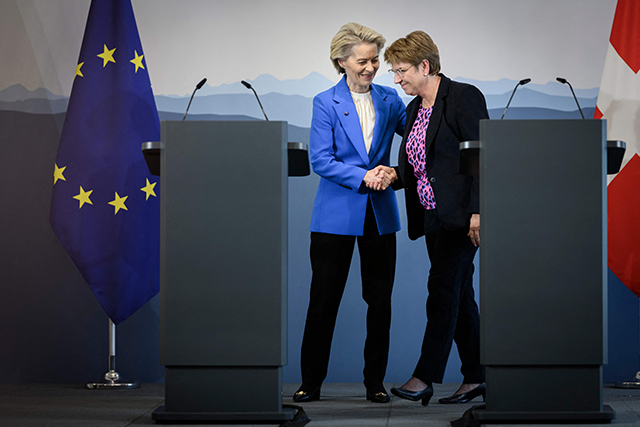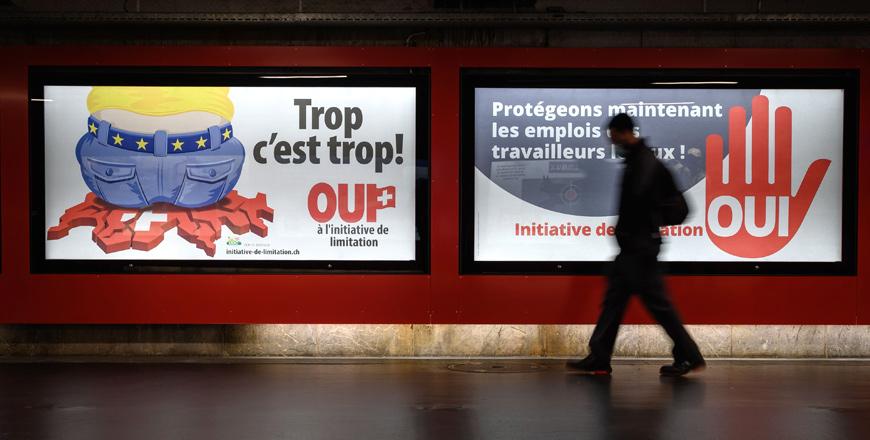You are here
EU chief in Bern to reset ties with Switzerland
By AFP - Dec 21,2024 - Last updated at Dec 21,2024

Swiss President Viola Amherd shakes hands with European Commission President Ursula von der Leyen after a statement in Bern on Friday (AFP photo)
BERN, Switzerland — European Commission president Ursula von der Leyen visited the Swiss capital recently to seal a new set of agreements aimed at stabilising the country's ties with the bloc after disagreements over freedom of movement across Switzerland's borders.
Switzerland was set to announce it has concluded the package deal with the European Union which would recalibrate relations with the surrounding bloc.
However, the government's green light, after years of sometimes hostile negotiations, is just the first step on the road to refreshing relations between the wealthy Alpine nation and its biggest trading partner.
The Swiss parliament will also have its say — with the hard-right Swiss People's Party (SVP), the country's biggest party, fiercely opposed to any rapprochement with the EU — and the public will likely have the final word in a referendum.
A sticking point in the talks — which has now reportedly been resolved — had been Switzerland's stubborn efforts to secure an exemption to the EU's cherished free movement of people between countries.
On Friday, SVP lawmakers stood outside the parliament in Bern holding up candles in what they called a vigil "for our independence and democracy", in opposition to the "package of lies" in the "EU submission treaty".
It said Switzerland would be forced to pay hundreds of millions of francs to the "crisis-ridden EU", saying the government's "logic is simply perverse: it is handing us Swiss over to the EU — and we are supposed to pay for it!"
SVP president Marcel Dettling said they were "fighting for the self-determination of the Swiss people".
'Delicate balance'
"President Von der Leyen is meeting with the president of Switzerland, Viola Amherd, in Bern," a European Commission spokesperson said Friday, adding that they would host a joint press conference at 1315 GMT.
Bern and Brussels are seeking to simplify and harmonise their ties, which are currently governed by a tangle of more than 120 separate agreements.
Relations plunged when Switzerland, suddenly and without warning, slammed the door on the negotiations in 2021.
The talks tentatively resumed in March, with the goal of concluding a deal by the end of the year.
Unlike previous attempts to seal an overarching framework agreement, the current negotiations have sought to update the existing agreements and conclude new ones on issues like electricity, health and food safety.
In recent days, Swiss media cited diplomatic sources saying that all the issues had been agreed, with the exception of how much Switzerland should pay into the EU's Cohesion Fund, which is aimed at reducing economic and social disparities in the bloc.
A fresh round of discussions on Tuesday "took place in a very positive atmosphere", a European diplomatic source said.
"We believe we have reached what is a very delicate balance, and should be appreciated as such by all parties."
The road to this point has been long: around 200 negotiation meetings have taken place.
Separate slices
Fearing it could be tough to win over voters, Bern last week reportedly changed its strategy, and cut the package of agreements into four separate "slices", according to Swiss public broadcaster SRF.
Each slice could then be put to a referendum separately, reportedly in the hope that it would be easier to win support on each narrow set of issues than on a broad package.
The Swiss Trade Union Federation has already called for further negotiations, warning that the agreement as it currently stands risks hitting Swiss wages.
Unions have also voiced concern at the potential impacts on Switzerland's rail and electricity sectors.
The Swiss business federation Economiesuisse supports an agreement.
It said a deal would "enable Switzerland to maintain the current conditions, allowing its economy to access the European market, and to develop them in important areas".
Related Articles
GENEVA — Swiss voters on Sunday rejected a bid to slash immigration from the EU, leaving free movement in the heart of Europe intact, and em
GENEVA — The Swiss will in May vote on a proposal that could dramatically limit immigration from the EU, six years after a similar referendu
BERN, Switzerland — Britain and Switzerland signed a deal on Monday to preserve trade relations between the two countries even if London opt













